The room is too small for over 20 people: singers and musicians. But no one seems to be bothered, and everyone focuses on what is more important: preparation to the group’s first concert.
We are in Da House, the cultural centre in Dokki, following a rehearsal by the AJAM choir. This is the ensemble founded by Moustafa Hussein, a singer with a portfolio of accomplishments in the field.
As the concert date approaches, AJAM moves to the Vibe for Developing Arts, “an integrated music complex, offering the best services and complete solutions for all musicians” as it’s description clarifies, a few floors down from Da House, in the same building. One of its studios serves as a location for the singers to finetune their repertoire.
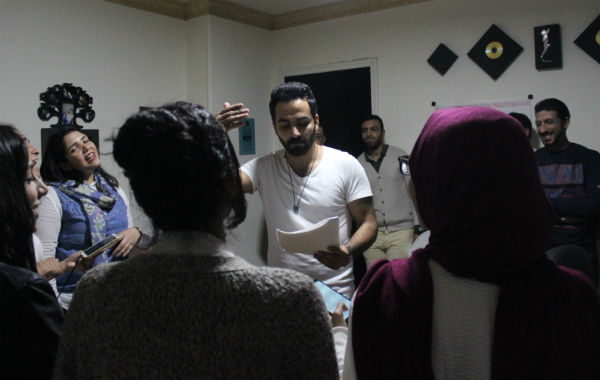
Led by Moustafa Hussein, the AJAM choir holds a rehearsal at Da House before their 21 March concert at El-Sakia (Photo: Ati Metwaly)
In no time, they feel ready to take the stage of the El Sawy Culturewheel (El-Sakia).
The first concert by AJAM took place in the El-Sakia’s Wisdom Hall on Wednesday 21 March. For all choir members, this was their first appearance on stage, let alone singing to a large audience gathered on that evening.
AJAM is a newly launched project by Hussein, a man who has liked to sing since a very young age. He decided to fuel his passion with training in 2012 when he started joining courses, workshops and eventually a few music projects and Oriental ensembles as a singer, soloist or in a group.
In 2014, he formed his own Moustafa Hussein Band, which became a platform for showcasing his original compositions as well as covers of older songs rearranged with a touch of jazz, Latin rhythms, etc. Not only did Hussein’s singing skill progress fast, he also discovered his unique ability to transfer acquired knowledge to other people.
As a result, several of his colleagues began to ask him for tips related to voice and singing, and a few of them encouraged him to launch a workshop of his own.
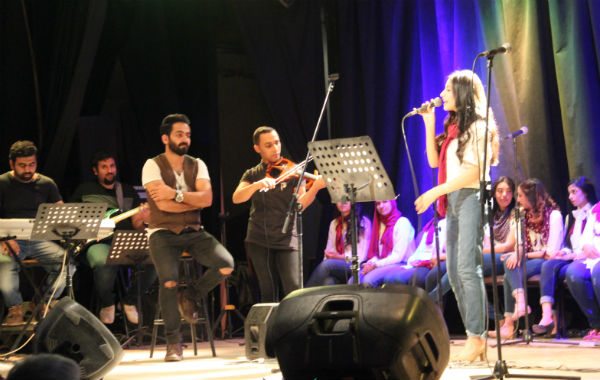
AJAM choir's concert at El-Sakia, 21 March (Photo: Ati Metwaly)
“It all developed by itself. One thing led to another and by the end of last year I decided to launch singing workshops at Da House. This is how AJAM was born,” Hussein explains.
For a small monthly fee, he says, the workshop is open to anyone interested regardless of ability or singing experience. The group consists of people from different walks of life, representing a variety of non art-related professions, aged six-40, yet with a majority being in their 20s.
“Currently, I work with 20 people and none of them has had any previous stage experience. All they came with was a hope they could sing even if at first it seemed impossible to them or to those who listened to them.”
Hussein gives the example of Mariam who, as he explains, was among the weakest members of the workshop and hardly produced any sound, often singing out of tune, but who due to her determination and a huge progress over a short time, made a sparkling appearance in the El-Sakia concert.
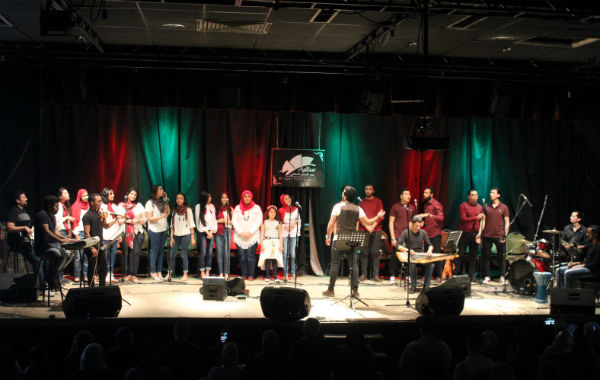
AJAM choir's concert at El-Sakia, 21 March (Photo: Ati Metwaly)
On 21 March, emotions ran high on both the performers’ and the audience’s part as they gathered at Wisdom Hall. The moment Hussein stood in front of the singers, silence fell, all eyes fixed on him. The emotional connection that each of the singers had developed with their mentor could not be missed.
After all, it is Hussein who brought new values into their lives, ones they will continue to cherish through further training and performances.
The evening included almost 20 songs by the whole group performing mostly individually. They were covers of well-known Egyptian compositions arranged by Hussein as well as two of his own works.
While a few songs were performed a cappella, most of the compositions were accompanied by a small band: Haitham El Masry on the kanoun, Nawar Magdi on the violin, Amr Bakkar on percussions, Amir El Saedi on drums, George Makram on keyboard and Ashraf Eskandar on the bass guitar.
Hussein introduced the singers and, as they sang, he stood to the side of the stage. He appeared casual but his presence served as an obvious and an important moral support for the singers. Finally, Hussein performed his original compositions to the audience’s warm applause.
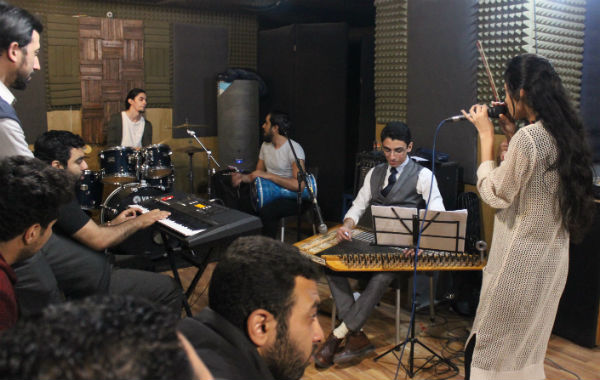
The AJAM choir holds a rehearsal at the Vibe for Developing Arts before their 21 March concert at El-Sakia(Photo: Ati Metwaly)
With all this potential and passion, AJAM still has a lot to discover and learn. The concert coming shortly after Hussein launched the workshops is part of his strategy to encourage the singers despite the fact that they are still at the beginning of their performing careers.
“I believe that anyone who can hear himself well, is capable of singing; he or she might need more or less training, that’s all. We work on the many elements of music and singing. I provide some theory, how to listen to music, what to hear in music, what the rhythms, scales are, how to follow them. I talk about technicalities such as the breathing techniques,” Hussein enumerates his methods, adding that reading musical notation will come in the workshop’s later stages. The practice is accompanied by lessons about presentation on stage.
Hussein’s belief that everyone can sing reflects many advanced studies on voice training where the researchers braid music with neurology, neuroscience and psychology.
We can recall researcher Marty Heresniak whom I mentioned in my article "Bluebirds' serenade: On singing out of tune" (published in 2015) and who believes that, unless neurological issues are involved, everyone is able to sing in tune and even sing beautifully.
In his paper “The Care and Training of Adult Bluebirds”, published in the Journal of Singing in 2004, Heresniak explains the reasons that lie behind some people being seemingly unable to sing in tune and suggests several cures to this problem. When applying his findings, he uses the expression “bluebirds” – a coinage he defines as children or adults unable to sing in tune.
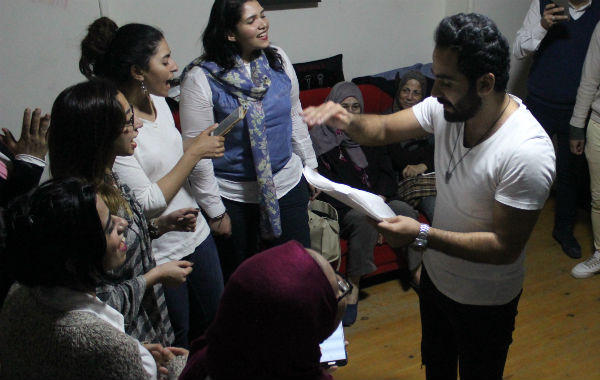
Led by Moustafa Hussein, the AJAM choir holds a rehearsal at Da House before their 21 March concert at El-Sakia (Photo: Ati Metwaly)
The right musical and vocal training can remedy their defects, Heresniak believes.“Once medical conditions are eliminated, what we are left with is as simple as lack of practice and/or education. Though music accuracy can be a gift from nature, in many cases it is a learned skill, a fact that Heresniak approaches on practical level,” I wrote in the aforementioned article.
“Again, Heresniak notes that for the great majority of out-of-tune singers who consider crossing the voice studio threshold, the singing teacher is exactly the right person to help correct the problem. A well-trained music educator has strategies to help [and] most bluebird students can learn to match pitch.”
Even if Hussein’s practice is still smaller in impact by comparison to Heresniak’s, he has undoubtedly proved to the members of AJAM and to the audience that he has what it takes to be an educator and a leader. Taking under his wing all who love to sing, including the bluebirds, he has a passion that helps him delve deeper into singing and education experience.
Hussein’s workshops take place twice a week, and some of them last for five hours each.
“It all depends on the lesson’s content and what we discover together along the way. Sometimes I feel that I need to give more focus to a certain point or a certain person, so it takes longer. But regardless of all that, the group is always focused and seems to enjoy it,” he comments.
Clear proof of how intense the AJAM members’ interest in music and singing is lies in the fact that none of those who joined the workshop three months ago has left, “except for one member whose work schedule changed in such a way that he could no longer attend,” Hussein clarifies.
“We still have a long way to go. I believe that everyone who is in the workshop will continue on the journey, while we always welcome new members as well."
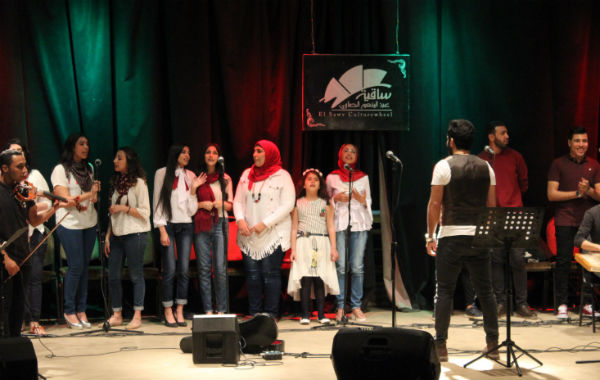
AJAM choir's concert at El-Sakia, 21 March (Photo: Ati Metwaly)
This article was first published in Al Ahram Weekly
For more arts and culture news and updates, follow Ahram Online Arts and Culture on Twitter at @AhramOnlineArts and on Facebook at Ahram Online: Arts & Culture
Short link: